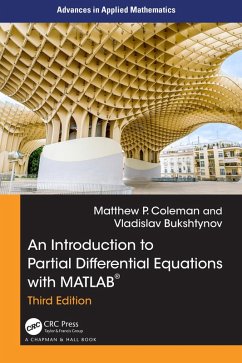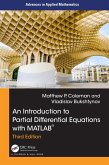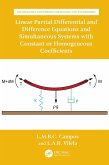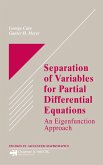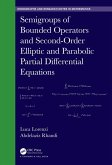Matthew P. Coleman, Vladislav Bukshtynov
An Introduction to Partial Differential Equations with MATLAB (eBook, ePUB)
115,95 €
115,95 €
inkl. MwSt.
Sofort per Download lieferbar

58 °P sammeln
115,95 €
Als Download kaufen

115,95 €
inkl. MwSt.
Sofort per Download lieferbar

58 °P sammeln
Jetzt verschenken
Alle Infos zum eBook verschenken
115,95 €
inkl. MwSt.
Sofort per Download lieferbar
Alle Infos zum eBook verschenken

58 °P sammeln
Matthew P. Coleman, Vladislav Bukshtynov
An Introduction to Partial Differential Equations with MATLAB (eBook, ePUB)
- Format: ePub
- Merkliste
- Auf die Merkliste
- Bewerten Bewerten
- Teilen
- Produkt teilen
- Produkterinnerung
- Produkterinnerung

Bitte loggen Sie sich zunächst in Ihr Kundenkonto ein oder registrieren Sie sich bei
bücher.de, um das eBook-Abo tolino select nutzen zu können.
Hier können Sie sich einloggen
Hier können Sie sich einloggen
Sie sind bereits eingeloggt. Klicken Sie auf 2. tolino select Abo, um fortzufahren.

Bitte loggen Sie sich zunächst in Ihr Kundenkonto ein oder registrieren Sie sich bei bücher.de, um das eBook-Abo tolino select nutzen zu können.
This 3rd edition changes the book structure by lifing the role of the computational part closer to the revised analytical portion. Useful for students of mathematics, physics and engineering who would like to focus on the practical aspects of using the theory of PDEs for modeling while later taking various courses in numbrical analysis.
- Geräte: eReader
- mit Kopierschutz
- eBook Hilfe
Andere Kunden interessierten sich auch für
![An Introduction to Partial Differential Equations with MATLAB (eBook, PDF) An Introduction to Partial Differential Equations with MATLAB (eBook, PDF)]() Matthew P. ColemanAn Introduction to Partial Differential Equations with MATLAB (eBook, PDF)115,95 €
Matthew P. ColemanAn Introduction to Partial Differential Equations with MATLAB (eBook, PDF)115,95 €![Linear Partial Differential and Difference Equations and Simultaneous Systems with Constant or Homogeneous Coefficients (eBook, ePUB) Linear Partial Differential and Difference Equations and Simultaneous Systems with Constant or Homogeneous Coefficients (eBook, ePUB)]() Luis Manuel Braga Da Costa CamposLinear Partial Differential and Difference Equations and Simultaneous Systems with Constant or Homogeneous Coefficients (eBook, ePUB)52,95 €
Luis Manuel Braga Da Costa CamposLinear Partial Differential and Difference Equations and Simultaneous Systems with Constant or Homogeneous Coefficients (eBook, ePUB)52,95 €![Fourier Series in Several Variables with Applications to Partial Differential Equations (eBook, ePUB) Fourier Series in Several Variables with Applications to Partial Differential Equations (eBook, ePUB)]() Victor ShapiroFourier Series in Several Variables with Applications to Partial Differential Equations (eBook, ePUB)66,95 €
Victor ShapiroFourier Series in Several Variables with Applications to Partial Differential Equations (eBook, ePUB)66,95 €![Textbook on Ordinary Differential Equations (eBook, ePUB) Textbook on Ordinary Differential Equations (eBook, ePUB)]() Ramakanta MeherTextbook on Ordinary Differential Equations (eBook, ePUB)102,95 €
Ramakanta MeherTextbook on Ordinary Differential Equations (eBook, ePUB)102,95 €![Separation of Variables for Partial Differential Equations (eBook, ePUB) Separation of Variables for Partial Differential Equations (eBook, ePUB)]() George CainSeparation of Variables for Partial Differential Equations (eBook, ePUB)64,95 €
George CainSeparation of Variables for Partial Differential Equations (eBook, ePUB)64,95 €![Introduction to Traveling Waves (eBook, ePUB) Introduction to Traveling Waves (eBook, ePUB)]() Anna R. GhazaryanIntroduction to Traveling Waves (eBook, ePUB)54,95 €
Anna R. GhazaryanIntroduction to Traveling Waves (eBook, ePUB)54,95 €![Semigroups of Bounded Operators and Second-Order Elliptic and Parabolic Partial Differential Equations (eBook, ePUB) Semigroups of Bounded Operators and Second-Order Elliptic and Parabolic Partial Differential Equations (eBook, ePUB)]() Luca LorenziSemigroups of Bounded Operators and Second-Order Elliptic and Parabolic Partial Differential Equations (eBook, ePUB)199,95 €
Luca LorenziSemigroups of Bounded Operators and Second-Order Elliptic and Parabolic Partial Differential Equations (eBook, ePUB)199,95 €-
-
-
This 3rd edition changes the book structure by lifing the role of the computational part closer to the revised analytical portion. Useful for students of mathematics, physics and engineering who would like to focus on the practical aspects of using the theory of PDEs for modeling while later taking various courses in numbrical analysis.
Dieser Download kann aus rechtlichen Gründen nur mit Rechnungsadresse in A, B, BG, CY, CZ, D, DK, EW, E, FIN, F, GR, HR, H, IRL, I, LT, L, LR, M, NL, PL, P, R, S, SLO, SK ausgeliefert werden.
Produktdetails
- Produktdetails
- Verlag: Taylor & Francis eBooks
- Erscheinungstermin: 1. August 2024
- Englisch
- ISBN-13: 9781040090152
- Artikelnr.: 72286468
- Verlag: Taylor & Francis eBooks
- Erscheinungstermin: 1. August 2024
- Englisch
- ISBN-13: 9781040090152
- Artikelnr.: 72286468
- Herstellerkennzeichnung Die Herstellerinformationen sind derzeit nicht verfügbar.
Dr. Matthew P. Coleman is a Professor Emeritus of Mathematics at Fairfield University, CT, where he taught from 1989 until his retirement in 2019. He received his Ph.D. in Applied Mathematics from Penn State University in 1989 under the guidance of Dr. Goong Chen. While at Fairfield, Dr. Coleman taught almost every undergraduate course in the curriculum, along with a number of graduate courses. In addition, he was department chair for ten years, did a brief stint as associate dean (though he was happy when it was over!), and was a visitor at Texas A&M, NYU, and National Taiwan University.
Dr. Coleman's main research area is Control Theory and, more specifically, the vibration and damping of distributed systems. He has published numerous articles in this area, while collaborating with people from numerous universities, in mathematics, physics, and various branches of engineering. In addition, he has authored the first two editions of the textbook "An Introduction to Partial Differential Equations with MATLAB".
Dr. Vladislav Bukshtynov is an Assistant Professor at the Dept. of Mathematical Sciences of Florida Institute of Technology (Florida Tech) since 2015 after finishing his 3-year postdoctoral term at the Dept. of Energy Resources Engineering at Stanford University and having his Ph.D. degree in Computational Engineering & Science at McMaster University in 2012. As a Professor, he actively teaches and advises students from various fields: applied and computational math, operations research, and different engineering majors. His teaching experience includes Multivariable Calculus, Honors ODE/PDE courses for undergrad students, Applied Discrete Math, and Linear/Nonlinear Optimization for senior undergrads and graduates. As a researcher, Dr. Bukshtynov leads his research group with several dynamic scientific directions and ongoing collaborations for various cross-institutional and interdisciplinary projects. His current interests lie in but are not limited to the areas of applied and computational mathematics focusing on combining theoretical and numerical methods for various problems in computational/numerical optimization, control theory, and inverse problems.
Besides being an expert in applying numerous optimization techniques, either analytically or numerically, Dr. Bukshtynov's expertise includes PDE-based modeling for various engineering applications. For example, he pioneered system reduction techniques using a 4D VAR method and earned the 2012 Cecil Graham Doctoral Dissertation Award from Canadian Applied and Industrial Mathematics Society (CAIMS). At Stanford, he was part of a large collaborative research project to develop efficient computational and optimization algorithms for solving oil field management problems for petroleum reservoir models.
At Florida Tech, Dr. Bukshtynov develops novel techniques suitable for reconstructing medical/computational images via solving inverse problems using multiscale simulation and optimization, optimal solution space multilevel parameterization, dynamical re-parameterization, and numerical methods for regularization. In addition, he has profound expertise in HPC programming. His particular strength is his ability to create hybrid computational frameworks by combining and tuning for optimal joint work scientific software of various types. As one of many examples, Dr. Bukshtynov is an author and active developer of EIT-OPT, an all-purpose open-structure multifaceted optimization framework for reconstructing biomedical images and early cancer detection via electrical impedance tomography. In 2023, Dr. Bukshtynov published a book "Computational Optimization: Success in Practice" with CRC Press to share his extensive experience in practical aspects of computational optimization with graduate students of math, computer science, engineering, and all who explore optimization techniques at different levels for educational or research purposes.
Dr. Coleman's main research area is Control Theory and, more specifically, the vibration and damping of distributed systems. He has published numerous articles in this area, while collaborating with people from numerous universities, in mathematics, physics, and various branches of engineering. In addition, he has authored the first two editions of the textbook "An Introduction to Partial Differential Equations with MATLAB".
Dr. Vladislav Bukshtynov is an Assistant Professor at the Dept. of Mathematical Sciences of Florida Institute of Technology (Florida Tech) since 2015 after finishing his 3-year postdoctoral term at the Dept. of Energy Resources Engineering at Stanford University and having his Ph.D. degree in Computational Engineering & Science at McMaster University in 2012. As a Professor, he actively teaches and advises students from various fields: applied and computational math, operations research, and different engineering majors. His teaching experience includes Multivariable Calculus, Honors ODE/PDE courses for undergrad students, Applied Discrete Math, and Linear/Nonlinear Optimization for senior undergrads and graduates. As a researcher, Dr. Bukshtynov leads his research group with several dynamic scientific directions and ongoing collaborations for various cross-institutional and interdisciplinary projects. His current interests lie in but are not limited to the areas of applied and computational mathematics focusing on combining theoretical and numerical methods for various problems in computational/numerical optimization, control theory, and inverse problems.
Besides being an expert in applying numerous optimization techniques, either analytically or numerically, Dr. Bukshtynov's expertise includes PDE-based modeling for various engineering applications. For example, he pioneered system reduction techniques using a 4D VAR method and earned the 2012 Cecil Graham Doctoral Dissertation Award from Canadian Applied and Industrial Mathematics Society (CAIMS). At Stanford, he was part of a large collaborative research project to develop efficient computational and optimization algorithms for solving oil field management problems for petroleum reservoir models.
At Florida Tech, Dr. Bukshtynov develops novel techniques suitable for reconstructing medical/computational images via solving inverse problems using multiscale simulation and optimization, optimal solution space multilevel parameterization, dynamical re-parameterization, and numerical methods for regularization. In addition, he has profound expertise in HPC programming. His particular strength is his ability to create hybrid computational frameworks by combining and tuning for optimal joint work scientific software of various types. As one of many examples, Dr. Bukshtynov is an author and active developer of EIT-OPT, an all-purpose open-structure multifaceted optimization framework for reconstructing biomedical images and early cancer detection via electrical impedance tomography. In 2023, Dr. Bukshtynov published a book "Computational Optimization: Success in Practice" with CRC Press to share his extensive experience in practical aspects of computational optimization with graduate students of math, computer science, engineering, and all who explore optimization techniques at different levels for educational or research purposes.
Chapter 1. Introduction. Chapter 2. The Big Three PDEs. Chapter 3. Using
MATLAB for Solving Differential Equations and Visualizing Solutions.
Chapter 4. Fourier Series. Chapter 5. Solving the Big Three PDEs on Finite
Domains. Chapter 6. Review of Numerical Methods for Solving ODEs. Chapter
7. Solving PDEs Using Finite Difference Approximations. Chapter 8. Integral
Transforms. Chapter 9. Using MATLAB's Symbolic Math Toolbox with Integral
Transforms. Chapter 10. PDEs in Higher Dimensions. Chapter 11. Overview of
Spectral, Finite Element, and Finite Volume Methods.
MATLAB for Solving Differential Equations and Visualizing Solutions.
Chapter 4. Fourier Series. Chapter 5. Solving the Big Three PDEs on Finite
Domains. Chapter 6. Review of Numerical Methods for Solving ODEs. Chapter
7. Solving PDEs Using Finite Difference Approximations. Chapter 8. Integral
Transforms. Chapter 9. Using MATLAB's Symbolic Math Toolbox with Integral
Transforms. Chapter 10. PDEs in Higher Dimensions. Chapter 11. Overview of
Spectral, Finite Element, and Finite Volume Methods.
Chapter 1. Introduction. Chapter 2. The Big Three PDEs. Chapter 3. Using
MATLAB for Solving Differential Equations and Visualizing Solutions.
Chapter 4. Fourier Series. Chapter 5. Solving the Big Three PDEs on Finite
Domains. Chapter 6. Review of Numerical Methods for Solving ODEs. Chapter
7. Solving PDEs Using Finite Difference Approximations. Chapter 8. Integral
Transforms. Chapter 9. Using MATLAB's Symbolic Math Toolbox with Integral
Transforms. Chapter 10. PDEs in Higher Dimensions. Chapter 11. Overview of
Spectral, Finite Element, and Finite Volume Methods.
MATLAB for Solving Differential Equations and Visualizing Solutions.
Chapter 4. Fourier Series. Chapter 5. Solving the Big Three PDEs on Finite
Domains. Chapter 6. Review of Numerical Methods for Solving ODEs. Chapter
7. Solving PDEs Using Finite Difference Approximations. Chapter 8. Integral
Transforms. Chapter 9. Using MATLAB's Symbolic Math Toolbox with Integral
Transforms. Chapter 10. PDEs in Higher Dimensions. Chapter 11. Overview of
Spectral, Finite Element, and Finite Volume Methods.
